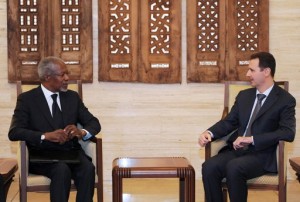 High-level diplomatic efforts to stop the fighting in Syria yielded mixed results on Saturday as President Bashar al-Assad shut the door on any immediate negotiations with the opposition and escalated a new military assault on the city of Idlib.
High-level diplomatic efforts to stop the fighting in Syria yielded mixed results on Saturday as President Bashar al-Assad shut the door on any immediate negotiations with the opposition and escalated a new military assault on the city of Idlib.
Mr. Assad told the United Nations envoy Kofi Annan that such talks would be fruitless as long as “terrorist groups” were operating in the country.
“No political dialogue or political activity can succeed while there are armed terrorist groups operating and spreading chaos and instability,” the state news agency, SANA, quoted Mr. Assad as saying.
Mr. Annan, the former United Nations secretary general, was sent to Damascus by the United Nations and the Arab League to try to negotiate a cease-fire. He was due to meet with Mr. Assad again on Sunday.
At an Arab League meeting in Cairo, diplomatic efforts grew heated as representatives Saudi Arabia and Qatar, who have called for arming the rebels, squared off against Russia, Mr. Assad’s most powerful backer, but ultimately the two sides produced an agreement that may be a sign of progress.
Russia’s foreign minister, Sergey V. Lavrov, told Arab League foreign ministers that his country, which vetoed a United Nations Security Council resolution on Syria last month and has provided arms to Mr. Assad, was “not protecting any regimes.”
Russia’s position, he insisted, was a matter of preserving international law, rather than “looking for a special prize or geopolitical interest.”
While Mr. Lavrov remained in the hall, the Saudi representative bluntly blamed Russia for allowing the killing to continue.
“We must stop issuing hollow resolutions and taking spineless positions,” the Saudi foreign minister, Prince Saud al-Faisal, said, according to Reuters. “The position of those countries which thwarted the U.N. Security Council resolution and voted against the resolution of the General Assembly gave the Syrian regime a license to extend its brutal practices against the Syrian people.”
Mr. Lavrov seemed to suggest that the Russian stance would benefit autocratic Arab countries worried about their own restive populations. “We certainly believe that all outside actors must be extremely careful in addressing problems which your countries are facing,” he said, according to The Associated Press.
The comment appeared to be a diplomatic jab, especially at Saudi Arabia: despite its own dismal human rights record and the central role it played in repressing a popular uprising in Bahrain, the Saudis have led the charge to topple Mr. Assad, repeatedly invoking his brutality.
But the meeting ended with Russia and the Arab League agreeing to a five-point plan to end the violence. The Arab states dropped their calls for Mr. Assad to hand over power to his deputy, and endorsed a proposal that calls for a halt to the violence on both sides and a dialogue between the Syrian government and its opponents, The A.P. reported.
The flurry of diplomacy did nothing to halt the violence in the nearly year-old conflict, whose death toll has risen sharply in recent weeks. Activists and journalists reported clashes between opposition fighters and the army in Idlib, where they said a new government offensive was underway.
A team of Associated Press reporters said government tanks that have encircled the town shelled it for several hours on Saturday. The journalists saw wounded opposition fighters being taken to clinics and a number of families fleeing the town.
An activist in Idlib, who reported seeing “heavy smoke,” said that at least three buildings had partly collapsed under the shelling on the western side of town. Another activist in the suburbs said relatives who fled spoke of abandoned neighborhoods.
“We’re expecting something like Baba Amr,” the activist said, referring to the neighborhood in the city of Homs that was the site of a monthlong siege by government troops trying to rout opposition fighters from a stronghold.
New York Times

Leave a Reply
You must be logged in to post a comment.